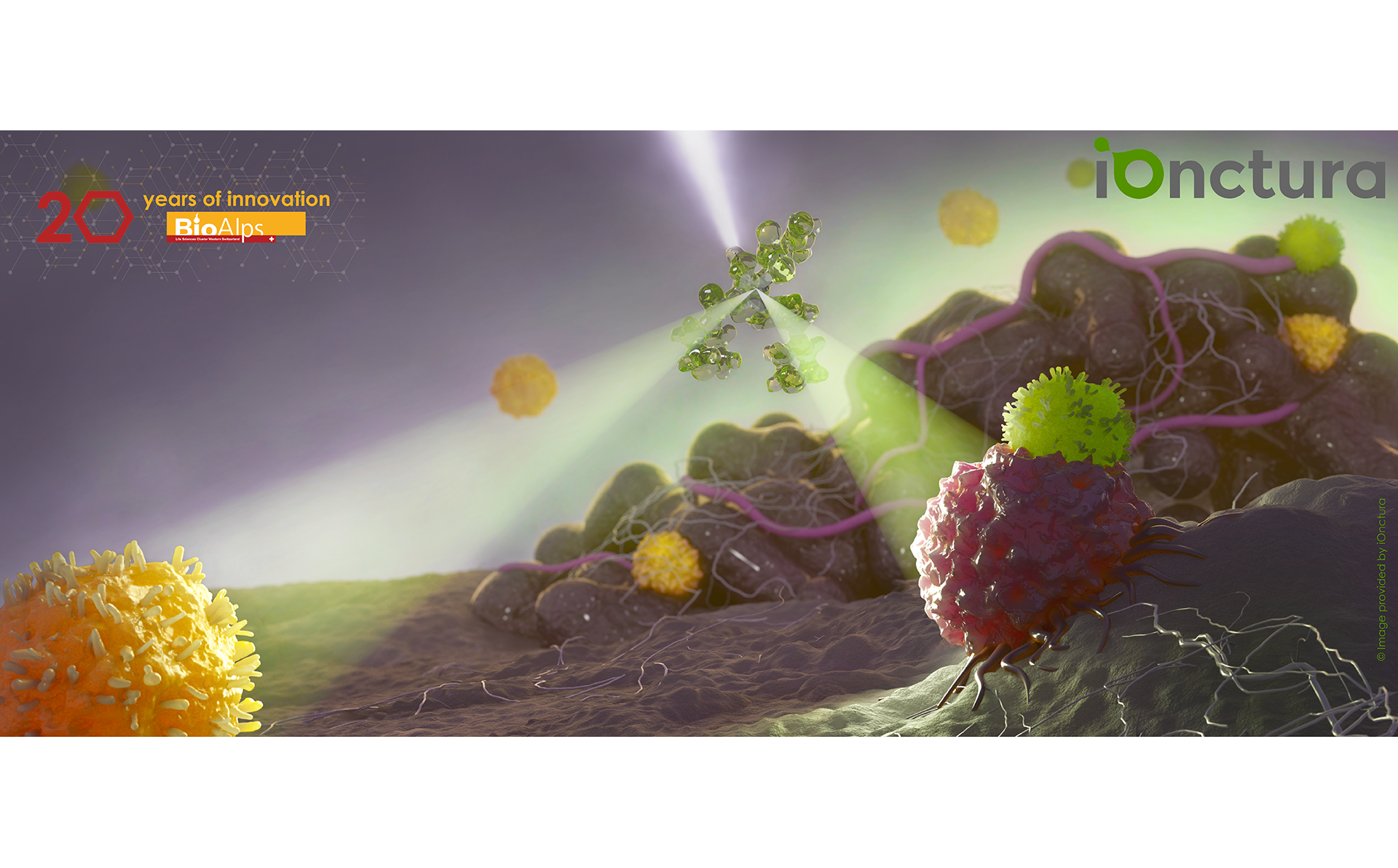
BioAlps | 20 years of innovation | iOnctura
Share this article
iOnctura | Better drugs to beat cancer resistance
We are pleased to share with you our new testimonial series as part of our ecosystem’s 20th anniversary celebrations. The series aims to provide a platform for regional Life Sciences key players to present themselves, share their perspectives on the development of Western Switzerland’s Life Sciences ecosystem and their outlook on upcoming challenges and opportunities. The following article is presented to you by iOnctura.
Presentation of iOnctura’s activities
iOnctura SA, founded in 2017, is a clinical stage oncology company targeting core resistance and relapse mechanisms at the tumour-stroma-immune interface. As of mid-2021, iOnctura, based at the Campus Biotech Innovation Park, has two drug candidates (IOA-244 and IOA-289) progressing through clinical trials, and two active preclinical programs. iOnctura’s best-in-class drug development programs combine immune-mediated and direct anti-tumour activity to deliver molecules with superior clinical efficacy and safety in oncology.
IOA-244’s properties enable it to bind selectively to an enzyme called PI3Kδ without breaking down to produce toxic metabolites that could limit its use. Its exquisite specificity allows the molecule to inhibit tumour growth without obliterating parts of the cellular immune response that are also needed to tackle cancer.
Major Life Sciences trends and developments
The emergence of cancer and the way it progresses depend on a complex interplay of molecular and cellular mechanisms in the tumour microenvironment. The nature of the tumour is obviously important, but so too are the features of the surrounding tissue (stroma) and the immune response. Immunotherapies have increased the range of treatment options for cancer patients, and they can extend survival times dramatically but only in a minority of patients and only for some cancer types. The role of the stroma in cancer development has always been a key focus for iOnctura, and its role in mediating resistance to immunotherapies has attracted increasing attention in recent years. iOnctura are exploring how their molecules can modulate not just the immune component of tumours, but also the contribution of the stroma to cancer development and drug resistance.
iOnctura’s contribution to Life Sciences in Western Switzerland
In parallel with developing its programmes for their monotherapy application, another key focus for iOnctura is to expand its therapies to combine with existing immunotherapies and/or with conventional chemotherapies to bring durable survival to more patients across a wide range of cancers. To understand where current drugs fall short, iOnctura has been active in exploring previously untapped mechanisms of tackling resistance and relapse at the tumour-stroma-immune interface, and our expanding pipeline of programs reflects our belief in this strategy as the future for cancer medicine.
iOnctura within the Life Sciences ecosystem of Western Switzerland
Like many biotechnology and small innovation-driven pharmaceutical companies, iOnctura depends on a network of supporting companies and research institutes. Academic-industrial partnerships are key to success across biotech, stitching companies like iOnctura into a highly credible research and development fabric that creates future value for patients. While the company’s clinical trial networks are wholly international, iOnctura already work with a number of cutting-edge, leading research teams both in Switzerland and further afield. The company has several collaborations with the University of Geneva, the Swiss Federal Institute of Technology Lausanne (EPFL) and the Swiss Institute of Bioinformatics (SIB).
iOnctura has also benefitted from the Swiss Innovation Agency’s (Innosuisse) support through funding of it’s collaborative research projects at the University of Bern and, most recently, at the Institute of Oncology Research (IOR) in Bellinzona.
The projects at Geneva, Lausanne and Bern formed part of the first phase of the company’s development, with a focus on understanding the mechanisms of action of iOnctura’s pipeline drugs. The recently funded project at IOR forms part of a second phase of collaborations that will look at patient characteristics and the nature of their tumours, features that will enable iOnctura to determine which combination treatments might increase response rates and durations, or minimise potential resistance pathways.
Significant foreseeable trends and challenges in Western Switzerland
These academic-industrial partnerships help build confidence in the science that underlies the company and supports its efficient development towards the ultimate goal of developing new options for cancer patients. On the other side of the coin, iOnctura has attracted a significant amount of private capital from outside Western Switzerland into the region. Maintaining a supportive environment for the growth of innovative companies cannot solely depend on the availability of direct fiscal incentives – welcome though these can be. There must also be mechanisms for embedding innovative firms in the local academic research culture so that knowledge flows in both directions. This is perhaps especially true in Life Sciences where complex biology creates both uncertainty and the potential for far-reaching new discoveries.
iOnctura’s foreseeable challenges and future collaborations
As iOnctura grows and expands its clinical program, however, the company may face different challenges. Within Switzerland, the established centres of clinical development with qualified and experienced personnel are in the pharma hubs of Basel and Zurich. The major market for iOnctura’s products, and the most likely source of capital for expansion, is the USA. The treatment of cancer is moving into a new phase, one in which rationally-designed interventions can be used to address specific underlying causes of disease, and new collaborations are envisioned across Western Switzerland in multi-omics, bioinformatics and clinical science to translate the promise of our pipeline into treatment reality for patients.